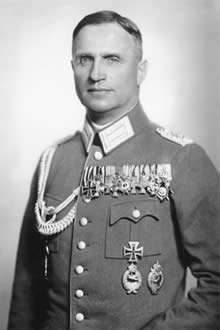Helmuth Wilberg
Helmuth Wilberg (born 1 June 1880, Berlin – died 20 November 1941, near Dresden) was a German officer of Jewish ancestry, the last Luftwaffe General of the Air Force during the Second World War.
Helmuth Wilberg | |
|---|---|
 | |
| Born | 1 June 1880 Berlin, German Empire |
| Died | 20 November 1941 (aged 61) Near Dresden, Nazi Germany |
| Allegiance | |
| Branch | Luftwaffe |
| Years of service | 1899–1941 |
| Rank | General der Flieger |
Military career
Wilberg joined the 80. Fusilier Regiment "von Gersdorff" (Kurhessisches) on 18 April 1899. He was promoted to Leutnant (lieutenant) on 27 January 1900 lieutenant. Starting in 1906, he worked as an instructor at the cadet schools at Naumburg and Lichterfelde. On 18 October 1909 he was promoted to Oberleutnant (senior lieutenant).
In 1911, he wrote the paper, "Aerial Reconnaissance in Kaisermanöver 1911: Its value and influence on leadership compared with the cavalry reconnaissance". In 1913, he enlisted in the Luftstreitkräfte (Imperial German Air Force), and was one of Germany's first military pilots. When war broke out he was a Hauptmann (captain) and commanding officer of 11. Feldfliegerabteilung (Field Aviation Battalion). He later served as Kommandeur der Flieger (commander of aviation, Kofl) of Fourth Army.
After the war, he was transferred to the Reichswehr. He served there until 1927, when he transferred to the Ministry of Defense; he also served with the Truppenamt, and finally as head of Luftschutzreferats.
He later joined 18. Infantry Regiment as a battalion commander, with the rank of Oberstleutnant (lieutenant colonel). From 1929 to 1932, he commanded the Breslau vicinity, being appointed Generalmajor (major general). He headed the Reichswehr air staff for eight years in the 1920s.[1]
Hermann Göring, in command of the Luftwaffe, considered making Wilberg Chief of Staff. However, it was revealed Wilberg had a Jewish mother. Not wishing his talent to go to waste, Göring had him reclassified "Aryan" and Wilberg remained in the air staff, helping draw up its principal doctrine, "The Conduct of the Aerial War", and its "Regulation 16" under Walther Wever.[2]
In subsequent years, he worked secretly on rebuilding the Luftwaffe, which he joined in 1934. Wilberg was initially a department head in the Reichsluftfahrtministerium (Ministry of Aviation, RLM). In 1935, he took over the construction of the air war school in Werder an der Havel, and later the Higher Air Force School in Berlin.
Wilberg significantly influenced German air war doctrine. In 1937, he created "Special Staff W", responsible for collecting and analyzing the tactical lessons learned by the Legion Kondor during the Spanish Civil War. In March 1938, he was promoted General der Flieger. In the mobilization of the Polish campaign in 1939, Wilberg was reactivated and used as head of aviation training command.
On 20 November 1941, he was killed in a plane crash near Dresden, on his way to the funeral of Ernst Udet.
Awards
- Royal Order of the Crown IV. Class[3]
- Iron Cross (1914) II. and I. Class[3]
- Knight's Cross of the Royal House Order of Hohenzollern with Swords[3]
- Bavarian Military Merit medal IV. Class with Swords[3]
- Mecklenburg Military Merit Cross II. Class[3]
- Mecklenburg Cross for distinction in war II. Class[3]
- Prussian pilot's reminder badge[3]
- Austrian Military Merit Cross III. Class with war decoration[3]
- Gallipoli Star Ottoman War Medal[3]
- Knight's Cross IV. Class II. Stage of the Bulgarian Military Order for bravery[3]
- Wehrmacht Long Service Award IV. to I. Class
Notes
- Corum, James. The Luftwaffe: Creating the Operational Air War, 1918–1940 (Lawrence, Kansas: University Press of Kansas, 1997), p. 125.
- Corum, p. 127; Hooton, E.R. The Luftwaffe: A Study in Air Power, 1933–1945 (London: Classic Publications, 2010), pp. 20–21.
- Rangliste des Deutschen Reichsheeres, Mittler & Sohn Verlag, Berlin, S.111
References
- Corum, James. The Luftwaffe: Creating the Operational Air War, 1918–1940. Lawrence, Kansas: University Press of Kansas, 1997. ISBN 978-0-7006-0836-2.
- Hooton, E.R. The Luftwaffe: A Study in Air Power, 1933–1945. London: Classic Publications, 2010. ISBN 978-1-906537-18-0.
- Rigg, Bryan Mark. Hitler's Jewish Soldiers. Lawrence, Kansas: University of Kansas Press, 2002. ISBN 0-7006-1178-9 (Modern War Studies series)
External links
- Helmut Wilberg at Fliegergrab.de